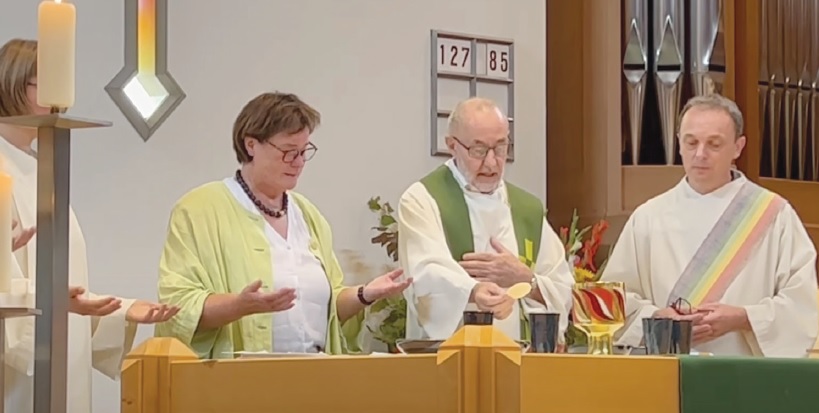
The Catholic bishops of the three German-speaking dioceses in
Switzerland — Basel, Chur and Sankt Gallen — have published a letter
calling for compliance with liturgical rules regarding the sacramental
authority that is attributed solely to the Church’s ordained presbyters
(priests).
“You all know that only the priest validly presides at
the Eucharist, grants sacramental reconciliation and administers the
anointing of the sick,” the three bishops state in the letter, which was
issued on January 5.
It is a clear response to what’s come to be
known in Switzerland as the “Monika Schmid affair”.
Schmid, who served many years as the de facto administrator of a parish in the Chur diocese, “concelebrated” at a Eucharistic celebration last August to mark her retirement. In the days immediately following, Chur’s Bishop Joseph Bonnemain ordered a preliminary canonical investigation “liturgical abuses”.
Now the new letter — signed by Bonnemain and Bishops Felix Gmür
(Basel) and Markus Büchel (Sankt Gallen) — has been seen as a warning to
Catholics who may be tempted to introduce unlawful liturgical
initiatives.
The letter is addressed to pastoral workers in
particular. “We know very well that your work often requires a balance.
There is a great gap between what you are burning for, your personal
faith, and confronting everything that makes the Church so painfully
behind the Gospel,” the three German-speaking bishops say.
Aware
of the tensions concerning the place of laity in the Church, they remind
the Catholics of their dioceses to rely on the synodal process as the
place to discuss ecclesial developments. “We are very grateful for the
synodal process, which shows us once again that we are on a journey
together and that only together can we be credible witnesses of Jesus
Christ,” they write.
They also remind their people of the
conditions that are required for valid celebrations of the Eucharist and
other sacraments. “Common witness requires common forms and rules. We
bishops regularly receive requests and worried reactions: The faithful
have a right to religious services that respect the rules and forms of
the Church,” they point out.
After underlining the universal
character of the liturgy, the bishops insist that these rules “concern
in particular those who preside at celebrations. You all know that only
the priest validly presides at the Eucharist, grants sacramental
reconciliation and anoints the sick. This is precisely why he is
ordained. This rule of Roman Catholic faith must be respected without
restriction in our dioceses,” they continue.
The bishops insist
that they are not trying to defend any sort of “patriarchal
clericalism”, arguing that “priests, in the service and execution of the
sacraments, make visible that Jesus Christ Himself acts in and through
the sacraments. They keep open, as it were, space for God’s action in
the liturgy”.
The discipline of the Catholic Church, the three prelates say, requires “a sacramental designation, that is, ordination, to preside at the celebration of the Eucharist and to say the Eucharistic prayer as a concelebrating priest”.
Building on the work of pastoral
leaders, the bishops nevertheless recognise some of the demands that lay
Catholics are making for a more open distribution of roles.
“We
hear the requests of many people to be able to participate in the
liturgy in other ways, for example as women. However, we urge you to not
make the sign of unity that is the liturgy into a testing ground for
personal projects. It is precisely in the worldwide celebration of the
same liturgy that we are Catholic and in solidarity with one another,”
the three bishops plead.
They point specifically to Pope Francis’
apostolic letter Desiderio Desideravi that insists on the quality of
liturgies, inviting Catholics to use “the diversity of forms for
liturgical celebrations that the Church offers. And to use places in the
liturgy, such as reflection, preaching, meditation, intercessions,
songs, music and silence, so that you can be part of it personally”.
